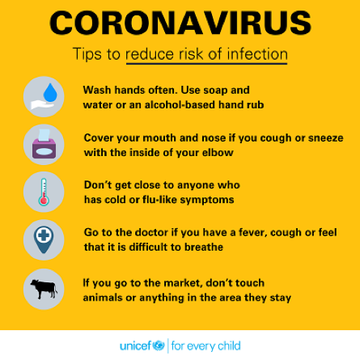Protecting Yourself and others
To help reduce the risk of infection and prevent Coronavirus – an illness that causes respiratory problems – you and your family should follow these 5 tips.

Wash your hands often
Wash your hands frequently with soap and water or use an alcohol-based hand rub if your hands are not visibly dirty.
Why? Washing your hands with soap and water or using alcohol-based hand rub eliminates the virus if it is on your hands.
Cover your mouth and nose when you cough or sneeze
When coughing and sneezing, cover mouth and nose with flexed elbow or tissue – discard tissue immediately into a closed bin and clean your hands with alcohol-based hand rub or soap and water.
Why? Covering your mouth and nose when coughing and sneezing prevent the spread of germs and viruses. If you sneeze or cough into your hands, you may contaminate objects or people that you touch.
Don’t get close to people with flu-like symptoms
Maintain at least 1 metre (3 feet) distance between yourself and other people, particularly those who are coughing, sneezing and have a fever.
Why?When someone who is infected with a respiratory disease, like 2019-nCoV, coughs or sneezes they project small droplets containing the virus. If you are too close, you can breathe in the virus.
Avoid touching eyes, nose and mouth
Why? Hands touch many surfaces which can be contaminated with the virus. If you touch your eyes, nose or mouth with your contaminated hands, you can transfer the virus from the surface to yourself.
Go to the doctor early
Tell your health care provider if you have traveled in an area in China where 2019-nCoV has been reported, or if you have been in close contact with someone with who has traveled from China and has respiratory symptoms.
Why? Whenever you have fever, cough and difficulty breathing it’s important to seek medical attention promptly as this may be due to a respiratory infection or other serious condition. Respiratory symptoms with fever can have a range of causes, and depending on your personal travel history and circumstances, 2019-nCoV could be one of them.
Practice hygiene when visiting live animal markets, wet markets, or animal product markets
Ensure regular hand washing with soap and potable water after touching animals and animal products; avoid touching eyes, nose or mouth with hands; and avoid contact with sick animals or spoiled animal products. Strictly avoid any contact with other animals in the market (e.g., stray cats and dogs, rodents, birds, bats). Avoid contact with potentially contaminated animal waste or fluids on the soil or structures of shops and market facilities.
Sign up to receive free updates on Coronavirus by enrolling in U-Report. Text JOIN to 24453 to get started.
Average Rating: ☆ ☆ ☆ ☆ ☆ (2 reviews)

